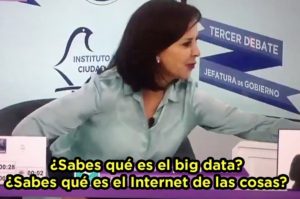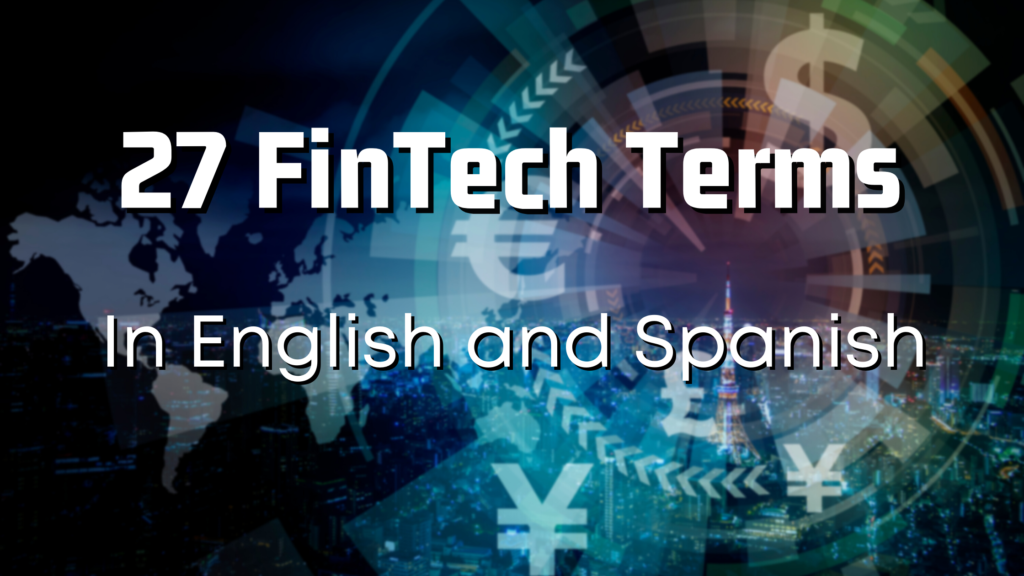During the first COVID lockdowns, businesses were closing their doors to slow the spread leaving thousands unemployed and forcing governments all over the world to issue emergency financial aid. The fastest way to get these funds out to those impacted by the pandemic was through direct deposit to a bank account or through a mobile app.
This prompted Latin American countries to begin adopting online banking, and now FinTech is there to stay.
At tradsolutely, we have followed the progress of Financial Technology (FinTech) in Latin America very closely. Some of our clients are at the forefront of this digital revolution and they have given us the privilege to translate some of their articles and research helping us learn a great deal about this new trend.
Now we want to share with you 27 of the most common FinTech terms we have encountered, and their Spanish translation. Don’t be surprised if you don’t see a term translated, as some of these terms are so new to Latin America that are being left in English, for now.
Keep in mind, these 27 FinTech Terms in English and Spanish are only the most common, and there is always an exception to any rule.

27 FinTech Terms in English and Spanish
1. Application Programming Interface (API)
SPA: Interfaz de Programación de Aplicación (API, por sus siglas en inglés)
An API is a set of routines, protocols, and tools for building software applications that allows multiple systems or applications to ‘speak’ to one another.
2. Big Data
SPA: Big Data – The literal translation is “gran cantidad de datos” but it must be left in English.
Big Data refers to structured and unstructured data that is too large or too complex to be processed by a traditional data management application. Financial services use Big Data to better understand their customers’ behavior using predictive data analytics.
3. Blockchain
SPA: Blockchain – The literal translation is “cadena de bloques,” but it must be left in English.
Blockchain is a secure digital record of transactions. Each block contains data around an individual transaction such as date, time, amount and is designed to be difficult to alter. Blockchain is structured so that individual blocks, are linked together in a single list, called a chain. They are popularly used in cryptocurrencies such as bitcoin.
4. Cloudsourcing
SPA: Cloudsourcing – The literal translation is “obtener recursos o información de la nube,” but it must be left in English.
Cloudsourcing is the outsourcing of IT services. The external provider will also host the company’s cloud computing. This allows all IT services to be processed through one external provider.
5. Crowdfunding
SPA: Crowdfunding – The literal translation is “microfinanciamiento o financiamiento colectivo,” but it must be left in English.
Crowdsourcing occurs when an individual or company submits a request, via the internet, for monetary donations from the general public. The money raised then goes towards funding a project or venture.
6. Cryptocurrencies
SPA: Cryptomonedas
Cryptocurrencies are virtual, decentralized currencies, a sub-class of crypto assets. The value of a cryptocurrency is not controlled by a bank but is instead determined by supply and demand. The most renowned cryptocurrency is Bitcoin.
7. Data Mining
SPA: Minería de datos
Data mining describes the process whereby you dig through data to discover hidden connections and patterns and then use this data to predict future trends. Most often it uses a combination of machine learning and artificial intelligence and is very much related to Big Data.
8. Digital Banking/Neobank
SPA: Banca digital/Neobanco
Neobanks operate solely online and through mobile apps. Customers can carry out traditional banking processes such as money transfers, loans, reviewing savings accounts without the need for a physical bank branch. A neobank won’t necessarily have their own banking license but may instead be a partner of a traditional bank.
9. Digital identity
SPA: Identidad digital
A digital identity is an individual’s online version of their physical identity, developed based on their online activity. A user’s digital identity is made up of data attributes such as username, search activities, purchasing behavior.
10. Digital Wallet
SPA: Wallet – Yes, in English. For Spanish speakers, “wallet” is automatically a digital wallet. The literal translation is “cartera o billetera digital.”
A digital wallet (also known as an E-wallet) involves the housing of payment information on an electronic device. Some digital wallets can also store a driver’s license.
11. FinTech
SPA: Fintech, or tecnología financiera but, in Latin America, Fintech is also used as a noun, whereas in English it’s “FinTech Company,” in Spanish those companies are just called Fintechs, as in la fintech or las fintechs.
FinTech is short for Financial Technology, is the word used to describe the emerging industry that aims to modernize, improve, and automate the delivery of financial services using modern software and infrastructure.
12. Geolocation
SPA: Geolocalización
Geolocation is the physical location of an individual or digital device.
13. InsurTech
SPA: InsurTech – The literal translation is “tecnología de seguros” but it must be left in English.
Short for Insurance Technology. It is designed to increase the efficiency of insurance companies. InsurTech is disrupting the insurance industry by reducing the costs for consumers and insurance companies, while also enhancing customer satisfaction.
14. Internet of Things (IoT)
SPA: El internet de las cosas (IoT por sus siglas en inglés)
The Internet of Things, or IoT, is a system of interconnected objects, devices, machines, gadgets, and more. An IoT-enabled device has a unique identifier (UID) which gives it the ability to transfer data over a network without the usual requirement of human-to-computer or human-to-human input.
15. KYC (Know Your Customer)
SPA: (KYC) Conozca a su cliente. In Spanish, we want to keep “KYC” somewhere in the sentence since this is a specific business process. We can write it as “Conozca a su client o KYC,” “Know your Client o Conozca a su cliente,” or “Conozca a su cliente (KYC).” You get the idea.
Know Your Customer, otherwise known as KYC, is the process whereby a business verifies the identity of the client. It is increasingly common to see financial institutions use KYC as a requirement to do business.
16. Machine learning
SPA: Aprendizaje automático
Machine learning uses Artificial Intelligence (AI) to provide systems with the ability to automatically learn and revise from experience, without the need for explicit programming. Machine learning typically focuses on the development of computer programs that can access data and learn from it.
17. Multi-factor Authentication (MFA)
SPA: Autenticación de multiples factores (MFA por sus siglas en inglés)
Multi-factor Authentication, also known as MFA, is a type of security system that requires a user to verify their identity through more than one method of authentication. Most typically, you will see this in use as Two-Factor authentication whereby a user will enter the password and then need to enter a code (or similar) from their phone.
18. Online investment platforms
SPA: Plataformas de inversión en línea
These are brokers that allow you to buy investments online through their website or trading platforms.
19. Open Banking
SPA: Banca abierta or Open Banking. Both are perfectly fine to use but you must be consistent. If you are only using Spanish words, keep it in Spanish.
Open Banking is the sharing of financial information securely, and in a way in which the customer approves of it. This is achieved through the use of open APIs, which enable developers to build applications and services.
20. P2P Transactions
SPA: Transacciones de red P2P or transacciones entre pares. We recommend including P2P somewhere in your sentence.
Peer-to-peer (P2P) transactions are the transmission of funds from one person’s bank account or credit card to another individual’s bank account via the internet, most often through a mobile phone.
21. RegTech
SPA: Regtech or the full translation which is: tecnologías aplicadas al cumplimiento regulatorio.
That’s a mouthful, so it’s better to stick with Regtech unless you are explaining the term.
Short for Regulatory technology. It is the use of information technology within the financial services industry to enhance the regulatory processes. Within RegTech, the main functions include compliance, reporting, and regulatory monitoring among others.
22. Sandbox
SPA: Sandbox or arenero
A sandbox is a term used to describe a testing program for new business models that are not protected by existing regulations. This allows companies to test their new products and services prior to becoming fully licensed, within a representative environment.
23. Sharing Economy
SPA: Ecoconomía colaborativa or economía compartida
Sharing economy is a peer-to-peer based economy where the acquisition and provision of goods and services are shared amongst a community.
24. Startup Company
SPA: Compañía Startup or startup
A startup company is a new business venture, started by entrepreneurs, that is in its first stages of operation typically with a fast-paced, forward-thinking approach.
25. Tokenization
SPA: Tokenización
Tokenization is the method of replacing sensitive data with unique identification symbols, phrases, or words, referred to as tokens. This process retains all sensitive information without compromising the security of the data, especially when dealing with eCommerce.
26. Unicorn
SPA: Unicornio
The term ‘unicorn’ was coined by venture capitalist Aileen Lee and is used to define a startup company with a valuation of over $1 billion. It refers to the rarity of a company reaching this valuation, similarly to the mythological creature.
27. VC (Venture capital)
SPA: Capital de riesgo or capital especulativo
Venture capital (VC) is a cash injection provided to startup companies and small businesses that have high growth potential. Venture capital typically comes from investors, investment banks, or other financial institutions in exchange for equity in the company.
These are just some of the terms that are becoming popular in the early stages of Digital Banking in Latin America, we will be keeping up on this new trend and keep you posted!

